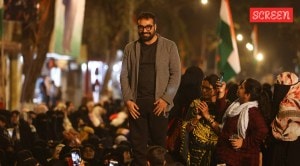High Noon at Hong Kong
Step outside the Hong Kong’s seabird-shaped glass and steel convention centre, where trade ministers from 149 nations are currently neg...

Step outside the Hong Kong’s seabird-shaped glass and steel convention centre, where trade ministers from 149 nations are currently negotiating how to bring down the trade barriers and boost global businesses, and one can sense the tension in the air.
Police in full riot gear have barricaded roads, helicopters hover above, and high-speed motor boats continuously move from one corner to the other of the sea-front convention centre. The anti-globalisation protestors are expected to barge in anytime to disrupt the meeting, fears the police.
Inside the venue, Commerce Minister Kamal Nath faces another tension — albeit for different reasons. India — now a leading member of hastily-cobbled Group of 110 countries — is trying to negotiate a deal that should be acceptable not only for the world, who want access to its domestic market, but also for the 600 million people back home engaged in the farm sector.
‘‘Where is the time to sleep?’’ asks a top official of the Indian delegation. ‘‘The minister came back to the hotel at 6 am this morning after spending the entire night negotiating.’’ Always smiling and giving quotable quotes, Nath not only attends dinners by desi corporate lobbies, he also calls up farmers’ unions at Victoria Park telling them he is looking after their interests.
But make no mistake: the minister is wanted by all — from governments, corporate lobbyists and, of course, the media. It is common to find either the CII, Ficci or Assocham members talking to the minister in a corner. Lunches are light — usually sandwiches — and pots of coffee are kept so that bureaucrats can remain awake thoughtout the night. ‘‘If you want to find out where the Indian minister is, ask any TV channel,’’ remarks a journalist.
What Nath wants from EU and US is to reduce their $1 billion a day subsidy to their farmers. ‘‘We have told them to reduce subsidy or we cannot go ahead with any other talks,’’ Nath said. The posturing by developing countries and a rigid position of Europe has already made mood grim as no one is expecting any breakthrough in the trade talks on its second-last day.
While Nath is staying at the Presidential suite of Renaissance Harbor view hotel, it is the Indian farmers agitating few blocks away in Victoria Park who warn him of any misadventure. ‘‘The minister has promised in Parliament that he will protect Indian farmers. The subsidies given by the Western countries has brought down the prices of all the commodities in the world markets and today Indian farmers are dying,’’ says Krishan Bir Chaudhary, executive chairman of Bharat Krishak Samaj, sitting on a plastic chair in a makeshift camp.
Other farmer leaders, who are living in cheap YMCA hostels or with friends and relatives, agree. ‘‘Our mood here is upbeat. The entire world media is reporting more about farmer’s protests than about the talks inside,’’ says Rakesh Tiket, spokesperson of Bhartiya Kisan Union who came along with five of his colleagues to join the WTO’s anti-globalisation protests — now made famous by militant Koreans peasants.
While the Indian farmers complain about lack of media coverage back home, the Indian corporate sector is busy at doing what it does best: lobbying. Dinners — usually with Indian food — are hosted by chambers of commerce for the entire Indian delegation, which includes bureaucrats, minister and the media. ‘‘This is a good time to talk to the minister one-to-one and learn what is happening inside the Green Room (where the negotiators meet),’’ said an official.
While a particular chamber of commerce is pressuring the government not to give foreign companies access to their market, the other wants it the other way around. That’s why two separate dinners by the chambers is quite apparent. ‘‘This is a place for lobbyists,’’ says Chaudhary. ‘‘We can’t host dinners so no one is listening to our point of view. But back home, I am sure everyone knows what happened to the India Shining campaign when farmer were ignored.’’
Photos


- 01
- 02
- 03
- 04
- 05





























